
Daily Brief – Where is the logic?
Where is the logic?
The question posed by this daily brief may sound like a Black Eyed Peas song had they been woefully unsuccessful. But based on yesterday’s trading patterns is a wholly deserved question. The key data highlight released during yesterday’s European session was the German Ifo survey. As one of the leading indicators for German and by consequence European sentiment, this statistic is closely watched and has significant influence over Euro crosses. The correlation is typically positive – a weak Ifo survey would encourage Euro weakness and vice versa.
When the latest release of this statistic hit markets yesterday morning, it showed a comprehensive fall in the index (85.7) versus expectations (86.0) and prior (86.5). So why then did the Euro appear to make a recovery? The first port of call to analyse this would be checking for opposing factors: despite the usual importance of the index was an opposing force present in markets that could have consumed and overwhelmed trading based on the Ifo publication? The answer is no, it seems the publication itself was responsible for the counter intuitive market reaction.
Instead, we find the cause only when considering it within the context of the collapse in the Euro in the sessions prior. European sentiment has been eroding rapidly as November has progressed. This has been triggered largely by weak European PMIs and Trump’s re-election. The spread between US and Euro rates has been widening heavily and EURUSD has retreated back towards parity. The Euro has therefore been exhibiting extremely distressed valuations in the sessions leading up to yesterday’s Ifo publication. Such pressures would only be consistent and therefore sustained if the Ifo survey presented a disastrous reading. Despite being poor, it was far from disastrous and therefore the typically positive correlation was broken. Lastly the forward-looking component of the Ifo was marginally more positive than its backwards counterpart.
Discussion and Analysis by Charles Porter

Related Insights

Daily Brief – Two cuts down
Two cuts down The Federal Reserve cut the target Fed funds rate by 25-basis points again last night. This brings the benchmark range down to a 3.75-4% banding. This move had been widely expected, but that does not mean it did not have any market impact. As of market open today, the dollar continues to […]

Daily Brief – A glimmer of (European) hope
A glimmer of (European) hope The ECB has made significant progress in cutting rates towards an accommodative level. The Eurozone saw evidence of cooling inflation much sooner than many economies and has been able to respond accordingly, cutting the deposit rate to 2%. The ECB will meet again this Thursday to publish its latest monetary […]

Daily Brief – Inflation’s peak?
Inflation’s peak? Yesterday’s publication of the latest UK inflation report will be welcomed by households and the government alike. The report released prior to the market open yesterday showed UK inflation to September remained stable month-on-month. That might not sound like a whole lot at face value, but it is in fact critical that headline […]


